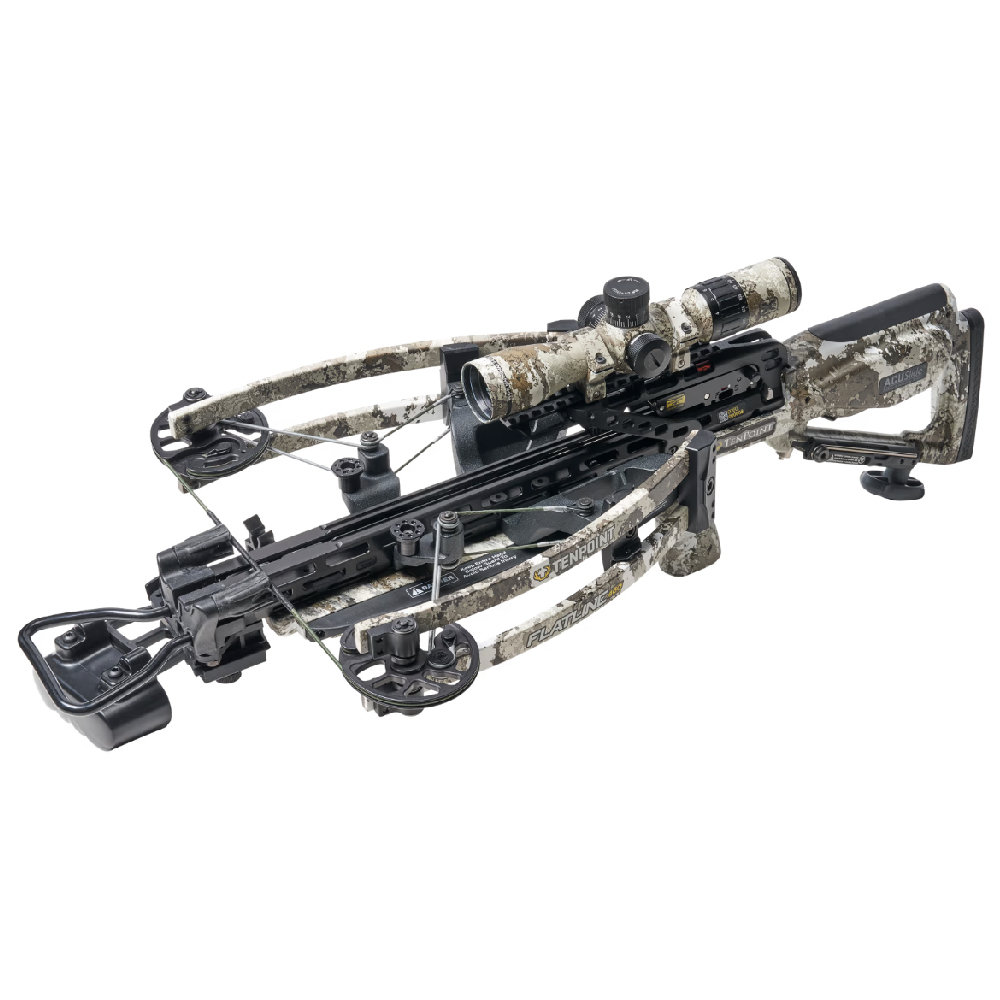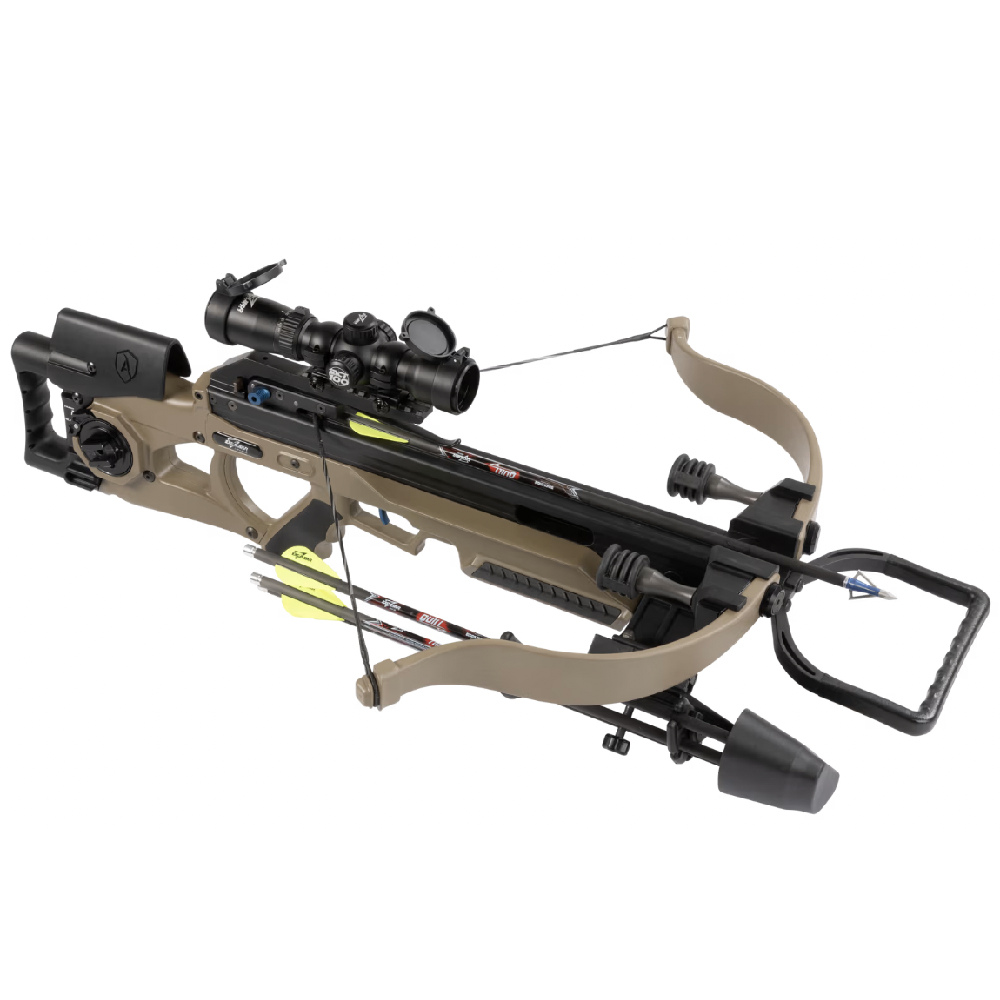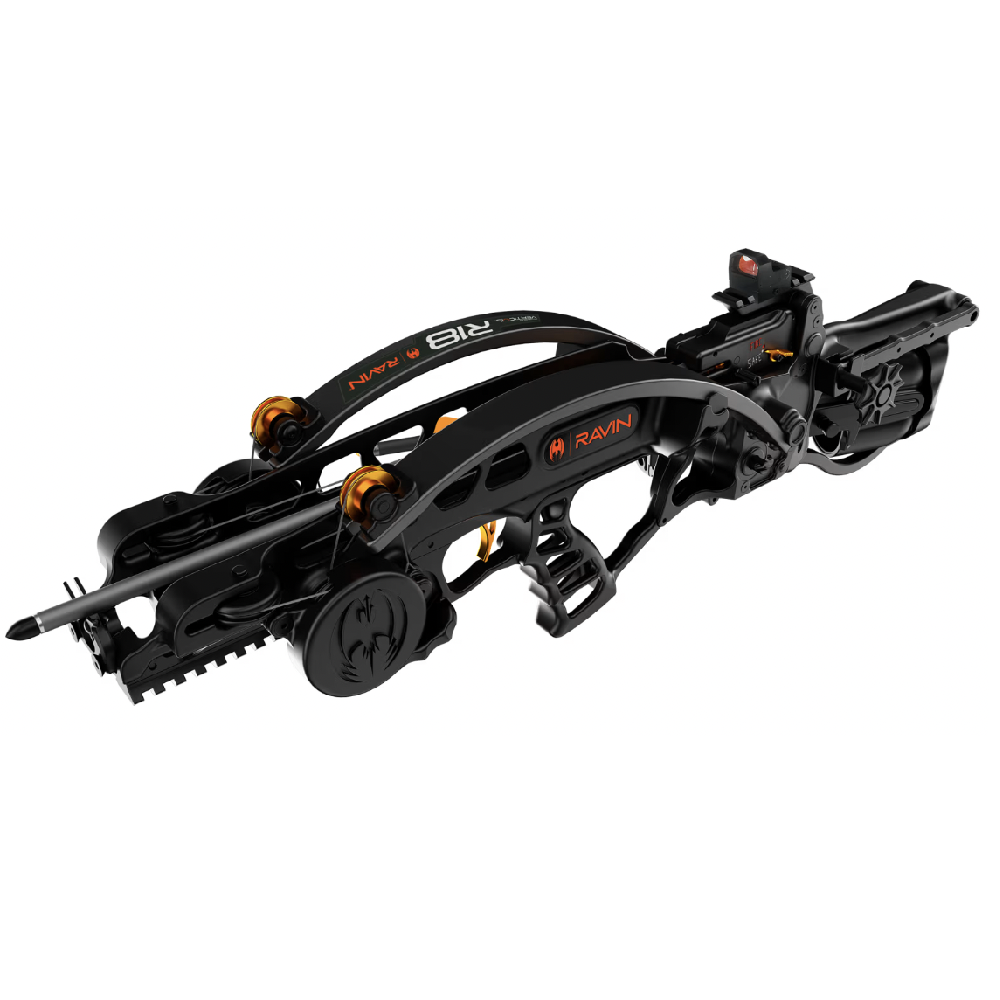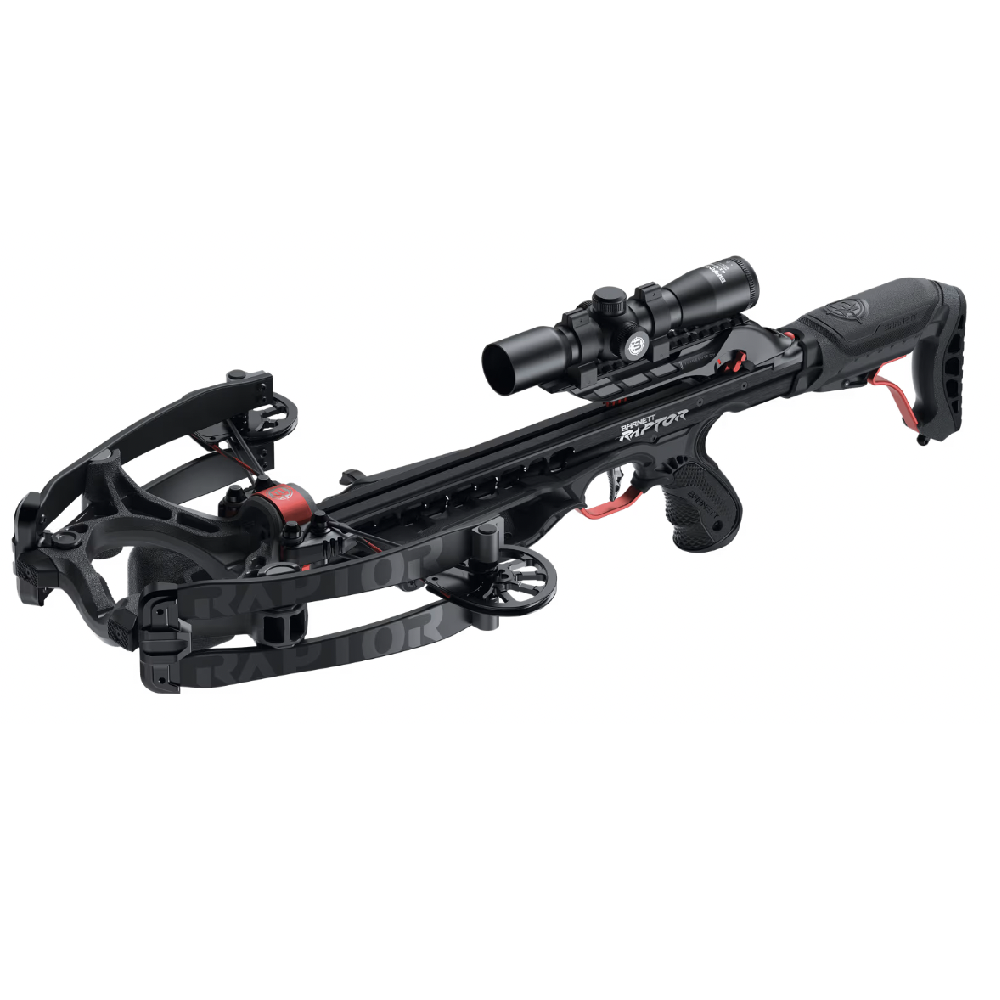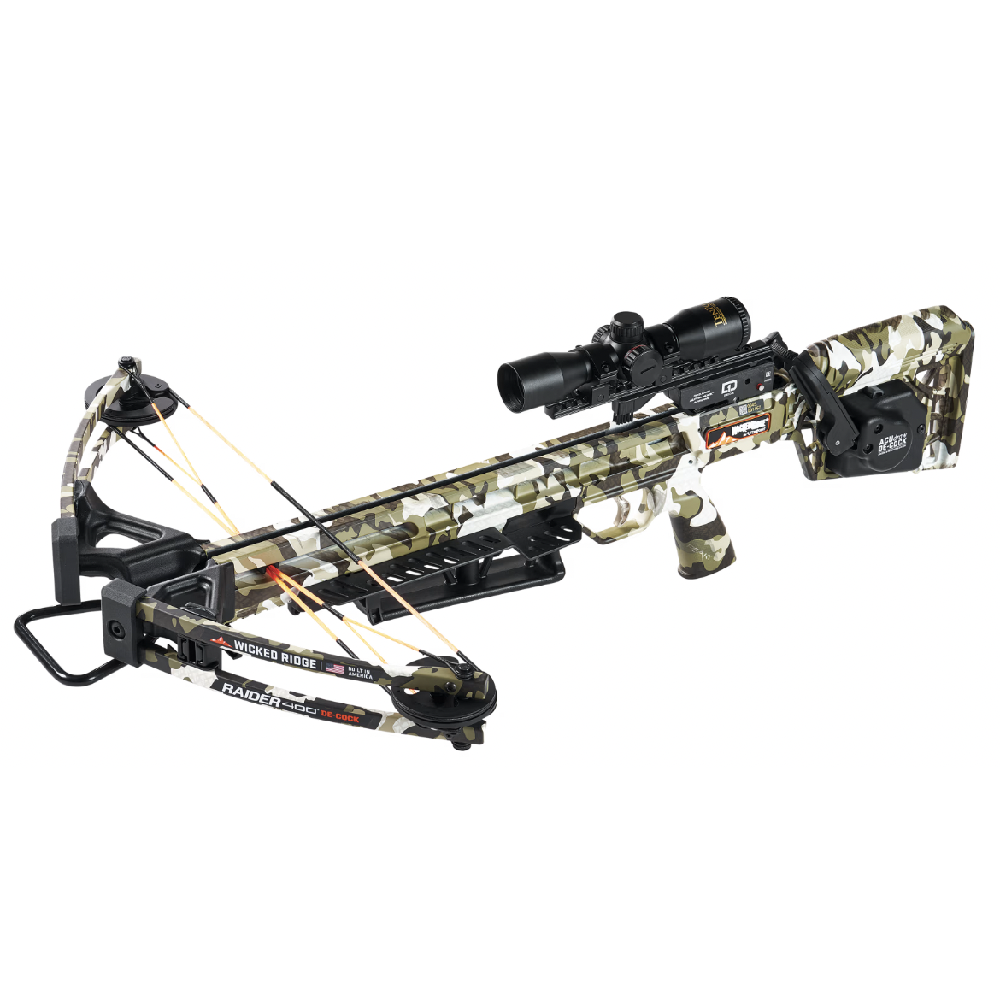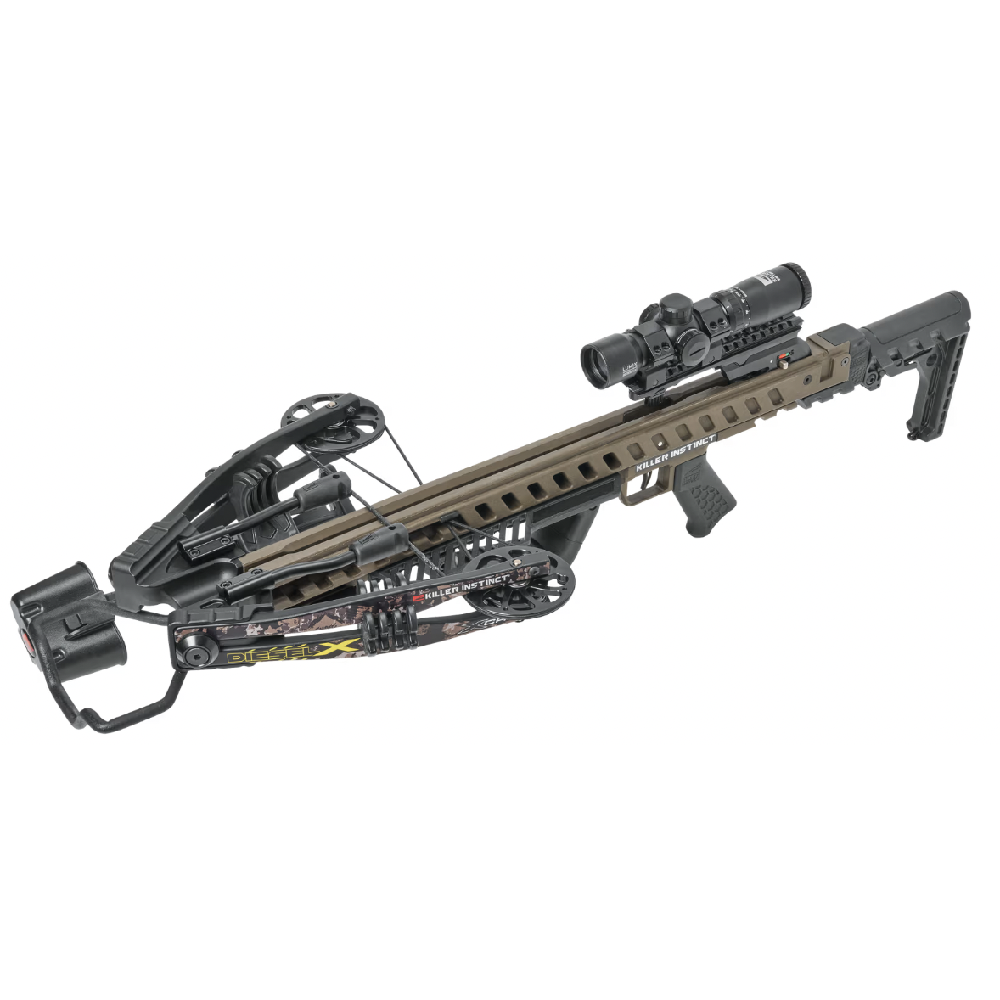We may earn revenue from the products available on this page and participate in affiliate programs. Learn more ›
Contrary to what many may think, the best crossbow isn’t necessarily the fastest. Is the race to build the most powerful crossbow over? Probably not. I bet we’ll see a 600-fps model within the next decade. But for now, crossbow manufacturer seem focused on giving hunters a more compact package rather than additional raw power. That’s good because crossbows are bulky, and they seem to triple in size once you’re up in a tree stand.
Although none of the top models we’ve tested threaten the 500-fps mark, they’re far from sluggish. The average speed for all crossbows we tested this year was 392 fps—about 50 fps faster than the average speed from 10 years ago. I remember when 400-fps speed was a big deal and you had to pay through the nose to get it. This year, some of the fastest crossbows came in at under $600—just one of several surprises our test panel uncovered during this year’s annual crossbow test. Here’s what else we found, along with our final picks for the best crossbows.
Best Overall: TenPoint Flatline 460
Most Accurate: Excalibur Assassin Extreme
Most Innovative: Ravin R18
Best Budget: Barnett Hyper Raptor
Best Overall: TenPoint Flatline 460
Specs
Speed: 472 fps with 408-grain finished arrow
Size: 26.5-inch overall length; 7.5 inches wide when cocked
Physical Weight: 7.5 pounds
Trigger Weight: 2.14 lb.
Accuracy: 1.68-inch average 40-yard group
Pros
By far the fastest bow in the test
Compact yet balances well
Crisp trigger
Best cocking/de-cocking system out there
Very good accuracy
Cons
Expensive
Last year’s excellent TenPoint Nitro 505 was all about speed, and for 2023, the company has followed it up with a crossbow that’s still plenty fast but focuses more on comfort, balance, and maneuverability. The Flatline 460 has many of the same features that made the Nitro 505 so good, including the RX8-Cam system, reverse-draw limbs, Micro-Trac barrel, and ACUSlide cocking system (which gets my vote as the safest, quietest, and easiest cocking/de-cocking system on the market). A notable upgrade to the Flatline 460 (and a good upgrade for crossbows in general) is TenPoint’s new aluminum Scope Struts, which strengthen the platform for scope mounting by 80 percent, according to the company. Weak scope-mounting systems are shockingly common on crossbows. The accessory package includes the ACUSlide, 100-yard EVO-X Marksman Elite scope, bubble level, six EVO-X CenterPunch arrows, quiver, and Sentry bow hanger.
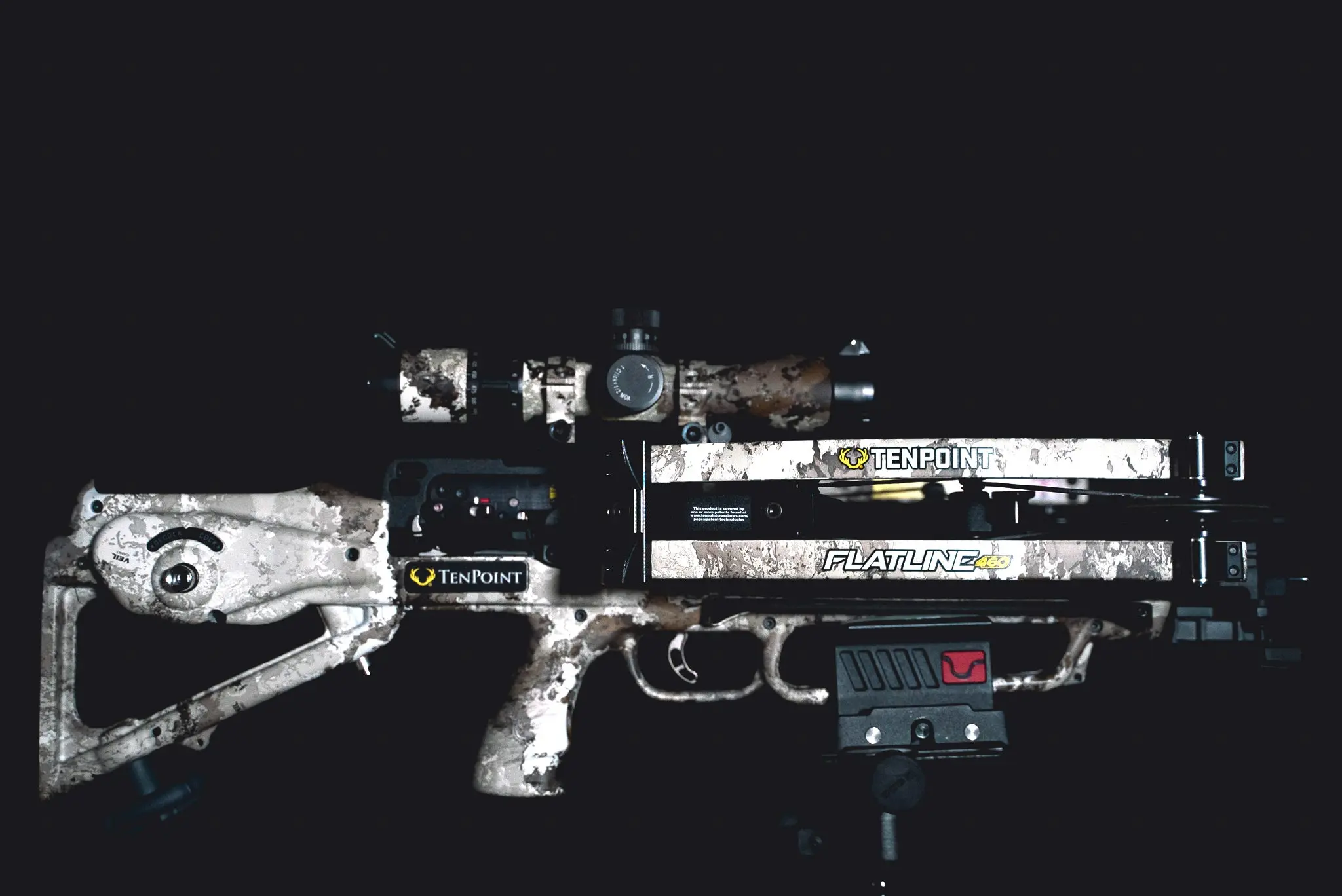
To get 460-plus-fps speed into such a compact platform, the Flatline 460 utilizes 16-inch arrows (20 inches has been more the standard arrow length for flagship TenPoint crossbows). Despite the short size, the arrows were heavy compared to this year’s competition, giving the Flatline 460 a significant leg up in the kinetic energy and momentum departments.
After years of testing crossbows, I’ve come to expect erratic broadhead flight from any 450-fps+ crossbow, and it’s an issue that seems to be compounded by short, stiff arrows. Still, broadheads flew consistently out of the Flatline 460. The point of impact was 3 inches off from field points at 30 yards, but that should only require a scope adjustment. I’d urge anyone who buys a Flatline 460 (or any high-speed crossbow) to plan on testing a number of broadheads to see which works best.
Retailing and more than $2,500, the Flatline 460 was the most expensive model in our test. But overall, we were impressed by just about every aspect of this crossbow. It was one of the best-handling of the test, being compact in size but with enough heft for good balance. The trigger was crisp and broke at just over 2 pounds, and average field-point group size was just over 1-1/2 inches at 40 yards. The overall fit, finish, and quality of both the crossbow and the accessories were flawless, and TenPoint crossbows have a limited lifetime operational warranty.
Most Accurate: Excalibur Assassin Extreme
Specs
Speed: 382 fps with 357.7-grain finished arrow
Size: 32 inches overall length; 20.5 inches wide when cocked
Physical Weight: 9.2 pounds
Trigger Weight: 3.2 lb.
Accuracy: 1-inch average 40-yard group
Price: $1,600 for camo version
Pros
Most accurate crossbow in the test
Improved cocking system
Rugged, simple design
Cons
Comparatively large and unwieldy
Lightweight arrows
The Excalibur recurve design has changed little over the years, mostly because it doesn’t need to. There have been ultra-compact models and a twin-shot model, and the bows have employed various cocking devices, some of which worked better than others to load those heavy limbs. But generally, you know what you are getting with this simple, rock-solid crossbow. The 2023 Assassin Extreme features the Charger Crank cocking system, which is integrated into the stock and is the best Excalibur has offered to date. The Assassin Extreme comes with the company’s usual outstanding accessories, including a 30mm Overwatch scope, quiver, 16.5-inch arrows, and sound dampeners.
Though the TenPoint Flatline 460 beat the Excalibur in enough categories to take top honors, it didn’t outshoot it. At 40 yards, our test team consistently shot better groups with this crossbow than anything else (though the Barnett Hyper Raptor was close behind it). Even better, fixed-blade broadheads hit within 1 inch of the field points.
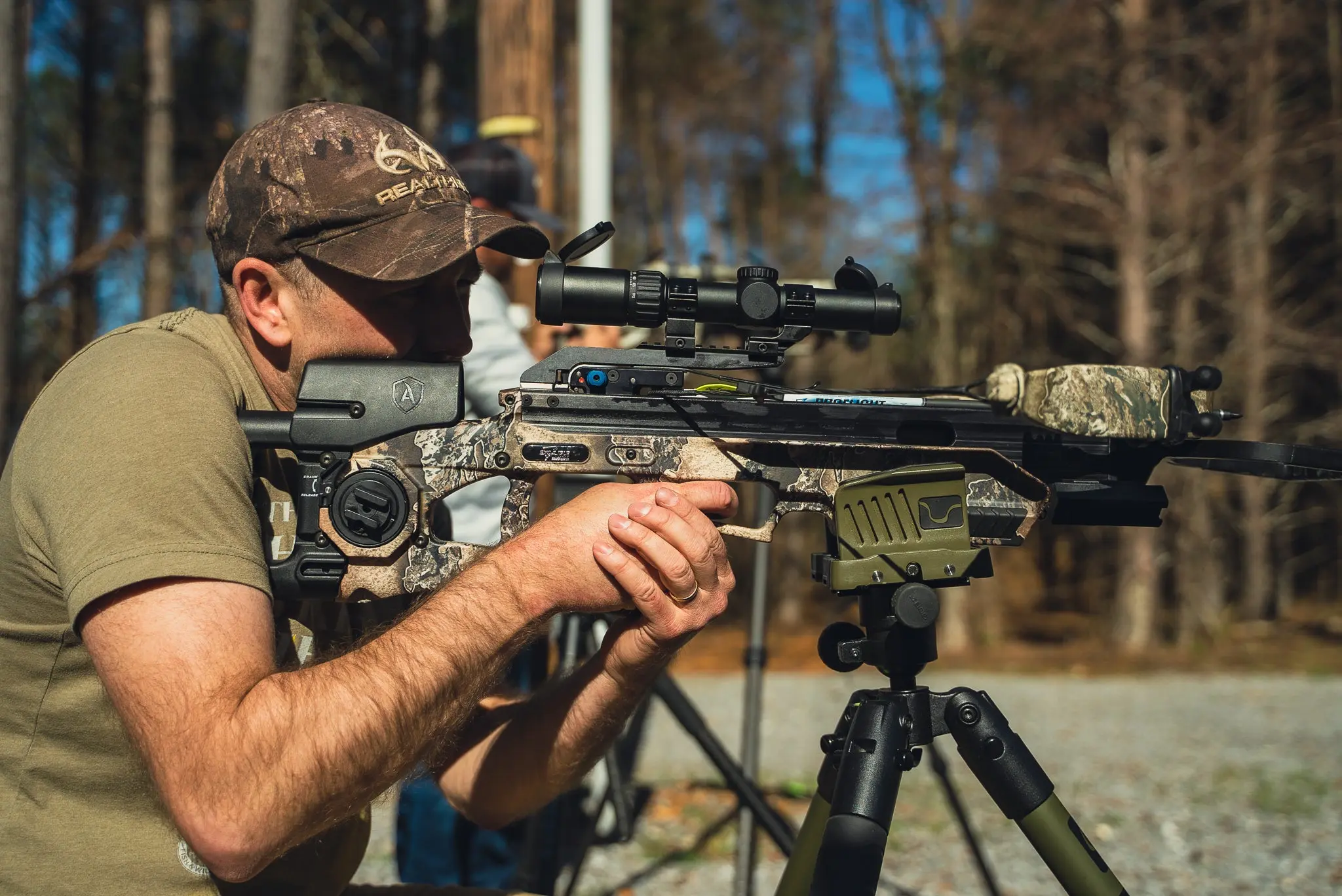
Recurve crossbows of any sort are physically big, which makes them more of a hassle to handle in a treestand or ground blind. Un-cocked, the Assassin Extreme is nearly as wide as the Tenpoint Flatline 460 is long. And even with a really good cocking system, like this one, recurve crossbows are more difficult to cock than most compound crossbows. Lastly, Excalibur crossbows rely on lightweight arrows to attain their advertised speeds, which translates to a little less in kinetic energy and momentum.
On the other hand, the recurve design is rugged and easy to maintain. Though I’m as impressed as anyone by the performance offered from high-end compound crossbows, I gravitate to a recurve over and again for personal hunting use because there’s not much that can go wrong. Excalibur crossbows have a limited lifetime warranty.
Most Innovative: Ravin R18
Specs
Speed: 325 fps with 352-grain finished arrow
Size: 25 inches overall length; 4.75 inches wide (cocked or un-cocked)
Physical Weight: 6 pounds
Trigger Weight: 2 lb.
Accuracy: 3.375-inch average 40-yard group
Pros
Incredibly innovative design
Smallest crossbow we’ve ever tested
Superb build quality
Decidedly cool
Cons
A little uncomfortable to shoot
Least-accurate in the test
Doesn’t accept a scope
Not Cheap
Ravin continues to challenge the conventions of crossbow design, and the R18 might be their most radical take yet. I was intrigued when I saw the first teasers for it a few years ago. Production issues made this crossbow slow to hit the market, but we finally got our hands on one for review.
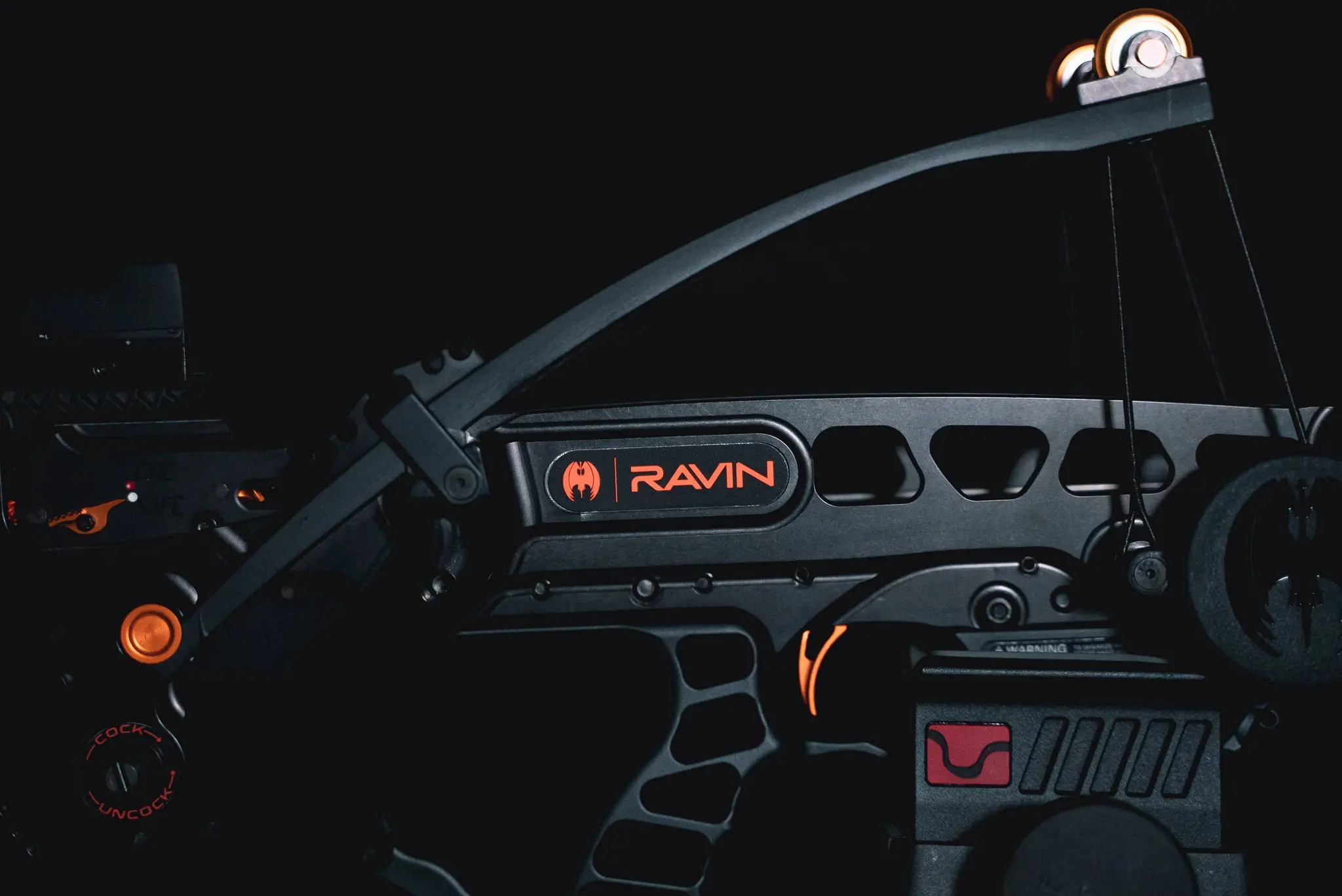
Most think of crossbow limbs as being either forward- or rear-facing; the R18 limbs are neither. In fact, they’re not even horizontal—they’re vertical and parallel to one another. When the R18 is cocked, the limbs flex along the crossbow’s barrel like a pair of St. Louis Arches, and they snap upward when fired. This allows for an extremely compact package. The vertical limb design is possible thanks to the new Verticoil Cam System, which rotates the enclosed cams 720 degrees and compresses the limbs. One could argue that since the limbs aren’t horizontal, the R18 is technically not a crossbow at all. Just don’t carry on about that and then complain because nobody invites you hunting. The R18 package includes a removable stock, 3-dot reflex sight, cocking device, three 16-inch arrows, and a quiver.
The R18 averaged the biggest groups of the crossbow test by a good margin, probably because it was the only crossbow tested that didn’t have a scope. Some people love red-dot sights for hunting. I don’t, and would in fact prefer iron sights. “Well, put a scope on it,” you might say, but that’s not possible on the R18, due to the tiny optic rail.
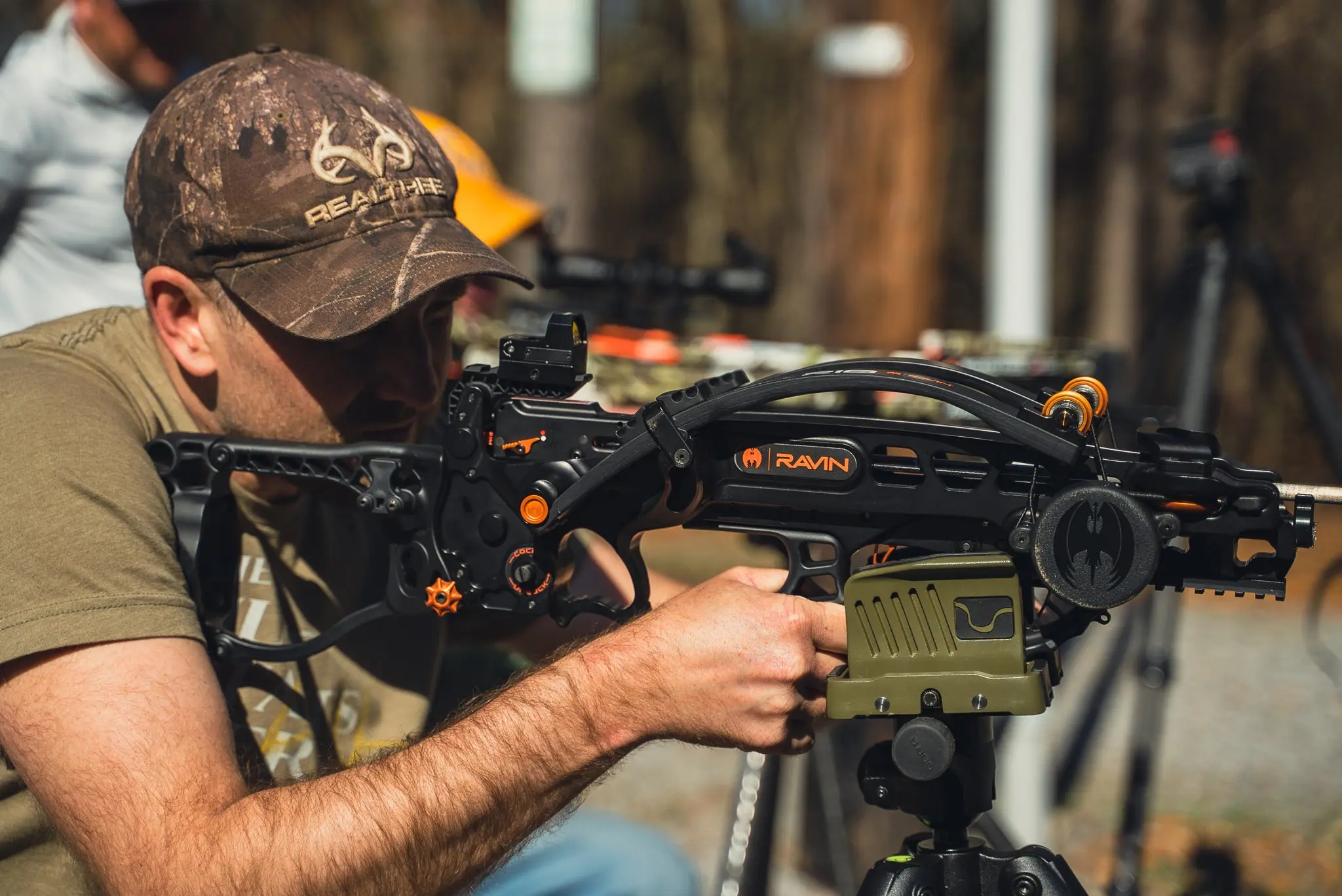
Besides that, this crossbow is actually a little too compact for comfort. The recoil of the limbs upon firing is unlike any other crossbow I’ve ever used, and not something I enjoy having just inches from my face. I think the Verticoil design has real potential, but I would like to see it incorporated into a slightly larger crossbow that’s more comfortable to shoot and will accommodate a good scope.
All of that said, the entire test team was impressed by how innovative and out-of-the-box this crossbow is. The R18 is unquestionably the smallest full-power crossbow we’ve ever seen, and probably ever made. It’s decidedly cool, and Ravin deserves credit for pushing the envelope. Although the bow looks like a novelty, the build quality is superb, same as every other Ravin crossbow I’ve used. At a little over $2K, it’s not cheap but it is significantly less expensive than other Ravin models, such as the R500 and R29X.
Best Budget: Barnett Hyper Raptor
Specs
Speed: 421 fps with 399-grain finished arrow
Size: 32.5 inches long; 7.3 inches wide (cocked)
Physical Weight: 7.1 pounds
Trigger Weight: 3.4 lb.
Accuracy: 1.3-inch average 40-yard group
Pros
Second most accurate bow in the test
Second fastest bow in the test
Second least-expensive bow in the test
Cons
Hardest to cock
Fit and finish not equal to top crossbows
The Barnett Hyper Raptor is designed to use Barnett’s excellent small-diameter HyperFlite arrows (which is what we tested it with). It’ll work with standard diameter arrows, too, but I don’t know why you’d choose them. Micro-diameter arrows might be the most underutilized component of the crossbow world, as they provide the same penetration and accuracy advantages in a crossbow as they do from a vertical bow.
In addition to micro-diameter-arrow compatibility, the Hyper Raptor has a number of other excellent features, including a CNC-machined aluminum flight track, soft bristle arrow retainer, anti dry-fire TriggerTech trigger system, Infinity cam system, and adjustable stock. One of my favorite components is the Rope Hold Roller Ball on the receiver, which is just a spring-loaded ball detent that holds your cocking rope in place. If you’ve never had a cocking rope slip off the groove of a crossbow receiver and end up against your scope mounts, you haven’t cocked many crossbows with a rope. The accessory package includes a 4×36 illuminated scope, sled-style rope cocking device, rail lube, quiver, and three arrows.
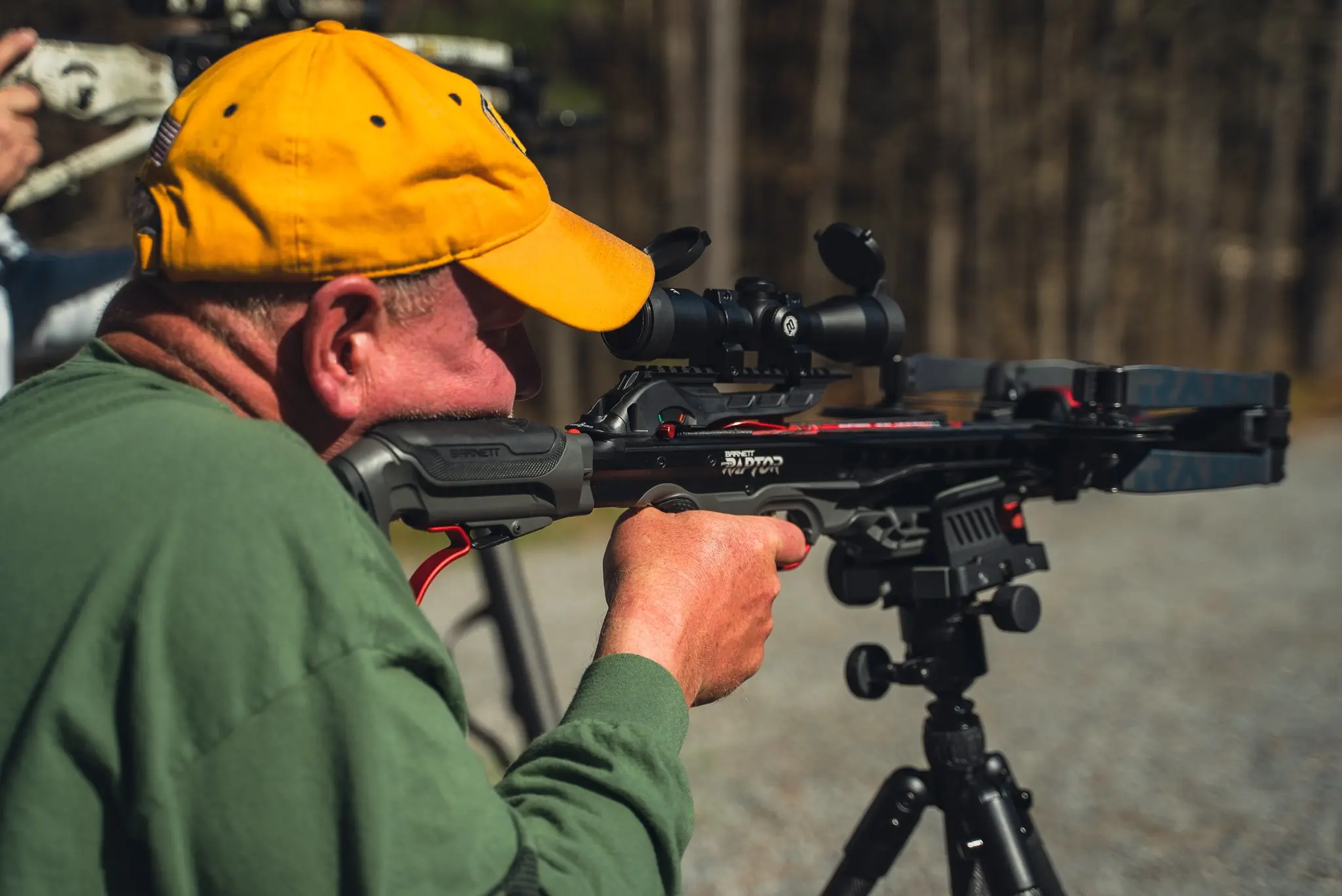
Personally, I like the simplicity of a rope-cocking device and much prefer them to the cheap-and-janky mechanical cocking devices sometimes sold with budget crossbows. But if you’re looking for a downside to this bow, cocking 205-pound limbs with a rope does require a heave and a grunt. Also, at 421 fps, those HyperFlite arrows can be too much of a good thing, too. I’ve still got one of them stuck in my 3D deer target that I physically could not pull out.
But that’s the end of the quibbles. Average groups for the Hyper Raptor were only a fraction of an inch larger than the Excalibur Assassin, the most accurate crossbow of the test. And with heavier bolts moving faster, this crossbow has more muscle. Despite all that speed and power, fixed-blade broadheads hit within an inch of the field points through the Hyper Raptor. Best of all, this crossbow retails for less than $600, making it the second-least expensive crossbow of the test and the runaway choice for best value. It is, for the money, one of the best-performing crossbows I’ve ever tested.
More Crossbows We Tested
Wicked Ridge Raider 400
Specs
Speed: 371 fps with 411-grain finished arrow
Size: 31.5 inches overall length; 15 inches wide (cocked)
Physical Weight: 5.8 pounds
Trigger Weight: 3.6 lb.
Accuracy: 1.53-inch average 40-yard group
Pros
Good accuracy
Good power
Extremely lightweight
Excellent value
Cons
So-so trigger
At the end of a day in the woods, you’ve got to de-cock your crossbow, either by shooting it or with a built-in de-cocking system. Those systems are commonly seen on expensive flagship crossbows (this year’s Tenpoint, Excalibur, and Ravin all have them), but the Wicked Ridge Raider 400 De-Cock incorporates a good de-cocking system into a much more budget-friendly crossbow.
You can opt for an ACU-Draw crank-style cocking/de-cocking device that’s incorporated into the stock, or you can go with a lighter-weight 6-position stock-and-rope sled cocking/de-cocking device, which is what we tested. De-cocking with the latter is simple: With the crossbow at full draw, you simply hold tension on the sled, press the de-cocking button, give the sled a little pull, and then slowly lower the string. The Raider 400 De-Cock also comes with a Pro-View lighted scope, quiver, and three arrows.
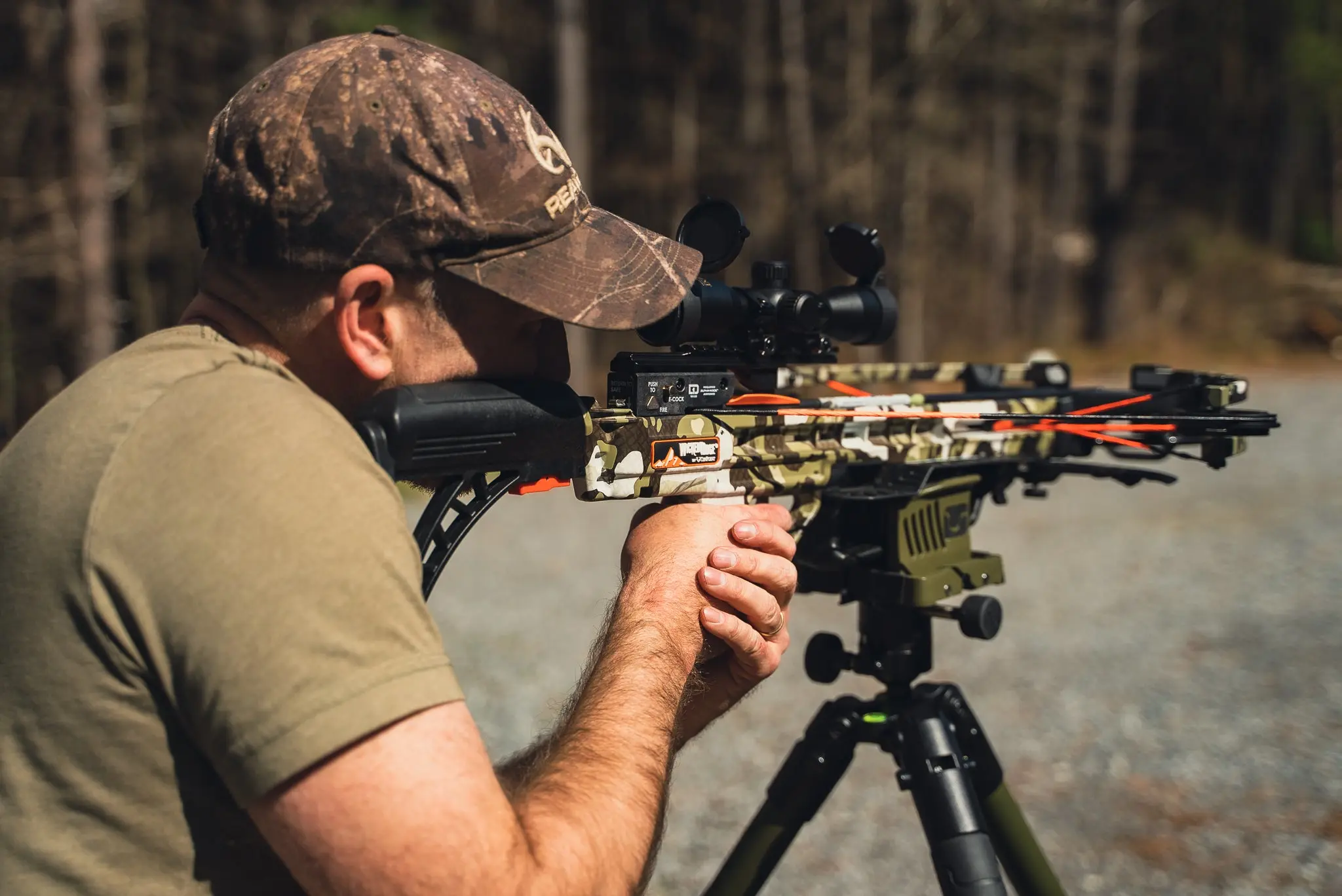
The AR-style adjustable stock of our test bow pulled right off the bow if you try to fully extend it too quickly. I’d prefer a hard stop, and though the two-stage trigger is good enough, it wasn’t great. Otherwise, there’s lots to like here. At less than 6 pounds, this crossbow is extremely lightweight. Though the traditional, forward-facing compound design isn’t too exciting, it is a simple, reliable crossbow that’s built well, shoots well, and has enough power to hunt an Allosaurus, should you get a tag. Though this crossbow didn’t shoot any of the test’s tightest field-point groups, it shot well enough, and it did put fixed-blade broadheads within an inch or so of the field points. Wicked Ridge crossbows have a limited lifetime operational warranty.
At around $750, the Ridge Raider 400 De-Cock didn’t miss Best-Value honors by much. The de-cocking feature is genuinely useful and very well made, but I don’t think it justifies this crossbow costing $150 more than the Barnett Hyper Raptor, which performed better across the board. Still, it’s a solid bow and an excellent value.
Killer Instinct Diesel X Elite
Specs
Speed: 401 fps with 390-grain finished arrow
Size: 34.4 inches overall length; 6.25 inches wide (cocked)
Physical Weight: 7.4 pounds
Trigger Weight: 3.2 lb.
Accuracy: 2.125-inch average 40-yard group
Pros
Good speed and power
Least expensive crossbow of the test
Cons
Comparatively big and bulky
Killer Instinct consistently produces excellent crossbows for the money, and the Diesel-X Elite is another good one. It sports the all-new X-Cam system, which has 50 percent let-off for easier cocking and, according to KI, makes for a quieter, more vibration-free crossbow. The Diesel-X Elite is compact at just 6.25 inches wide when cocked, and the stock is adjustable for length of pull. The accessory package includes a Lumix Speed Ring scope, rope sled cocking device, quiver, three arrows, and rail lube.
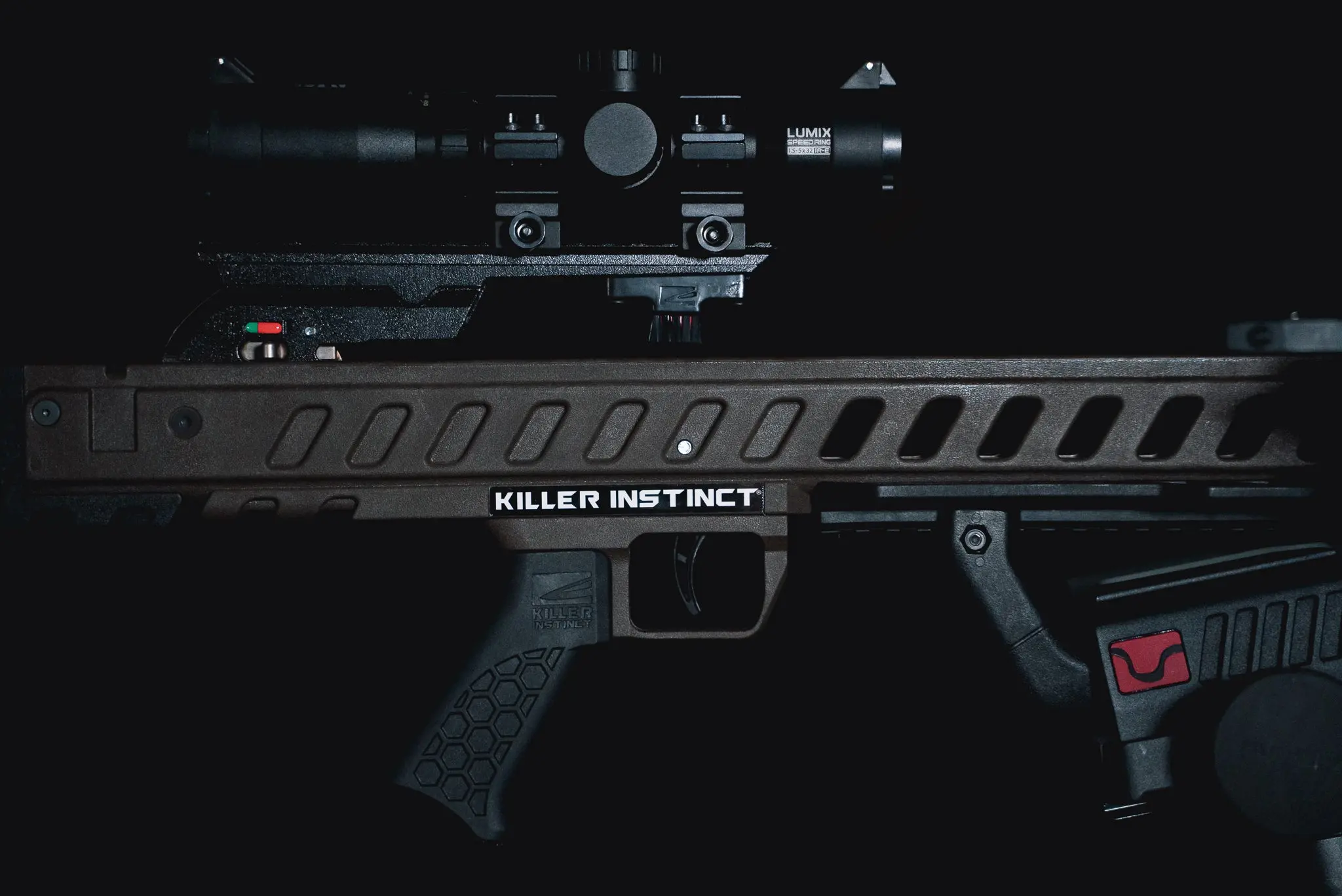
At nearly 35 inches long and 7.4 pounds bare bow, the Diesel-X is big and bulky, particularly so in this field. Though its 2-inch-plus 40-yard groups were more than adequate for hunting, and though fixed-blade broadheads hit more or less in the same place as field points, the Barnett Hyper Raptor proved that a crossbow in this price range can produce better accuracy.
This was the least-expensive crossbow we tested, however, and an outstanding value. It was easier to cock than the Barnett Hyper Raptor, which produces comparable speeds and also uses a rope sled cocking device. KI crossbows are well-built and boast a limited lifetime warranty.
How We Tested Crossbows
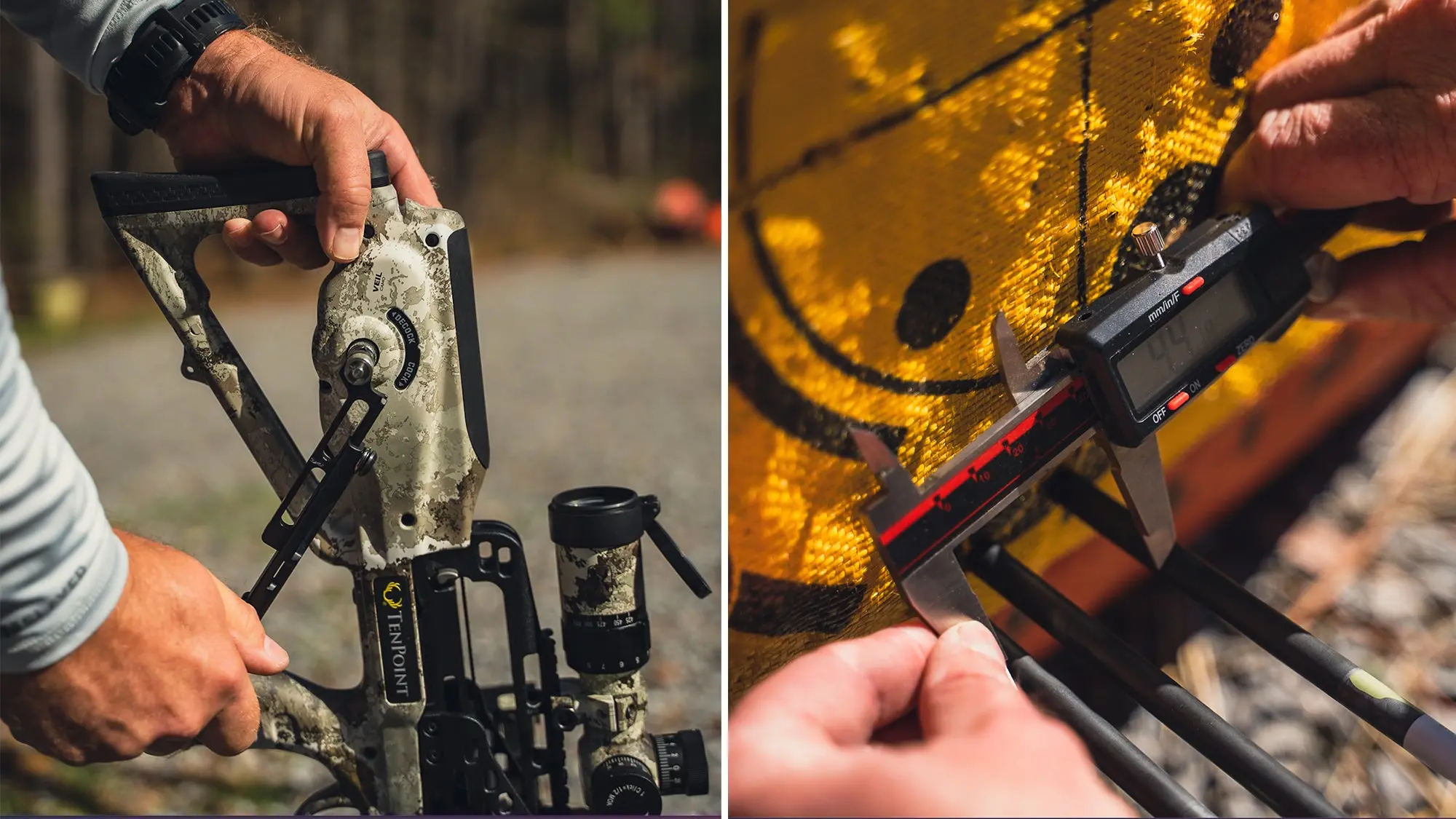
The Field & Stream crossbow test is an invitational. We tested each submitted crossbow with the accessories provided by the manufacturer, though it’s worth noting that some brands offer upgraded accessory packages, such as better scopes and cocking devices, for extra coin.
We chronographed every crossbow with the supplied arrows (or bolts; saying either is correct), and weighed the arrows on a powder scale. We checked trigger pulls with a Lyman trigger scale, and then zeroed each crossbow at 40 yards. After that, each of our three test-panel members fired three-shot groups through each crossbow from a seated position using Bog DeathGrip tripods. Finally, we fired additional shots with compact, fixed-blade broadheads (this year we used Muzzy Ones and G5 Montecs) to see where they hit relative to field points. (I’ve learned that as crossbow arrows get faster, shorter, or longer, and as fletching and nock styles change, good broadhead flight can become elusive.)
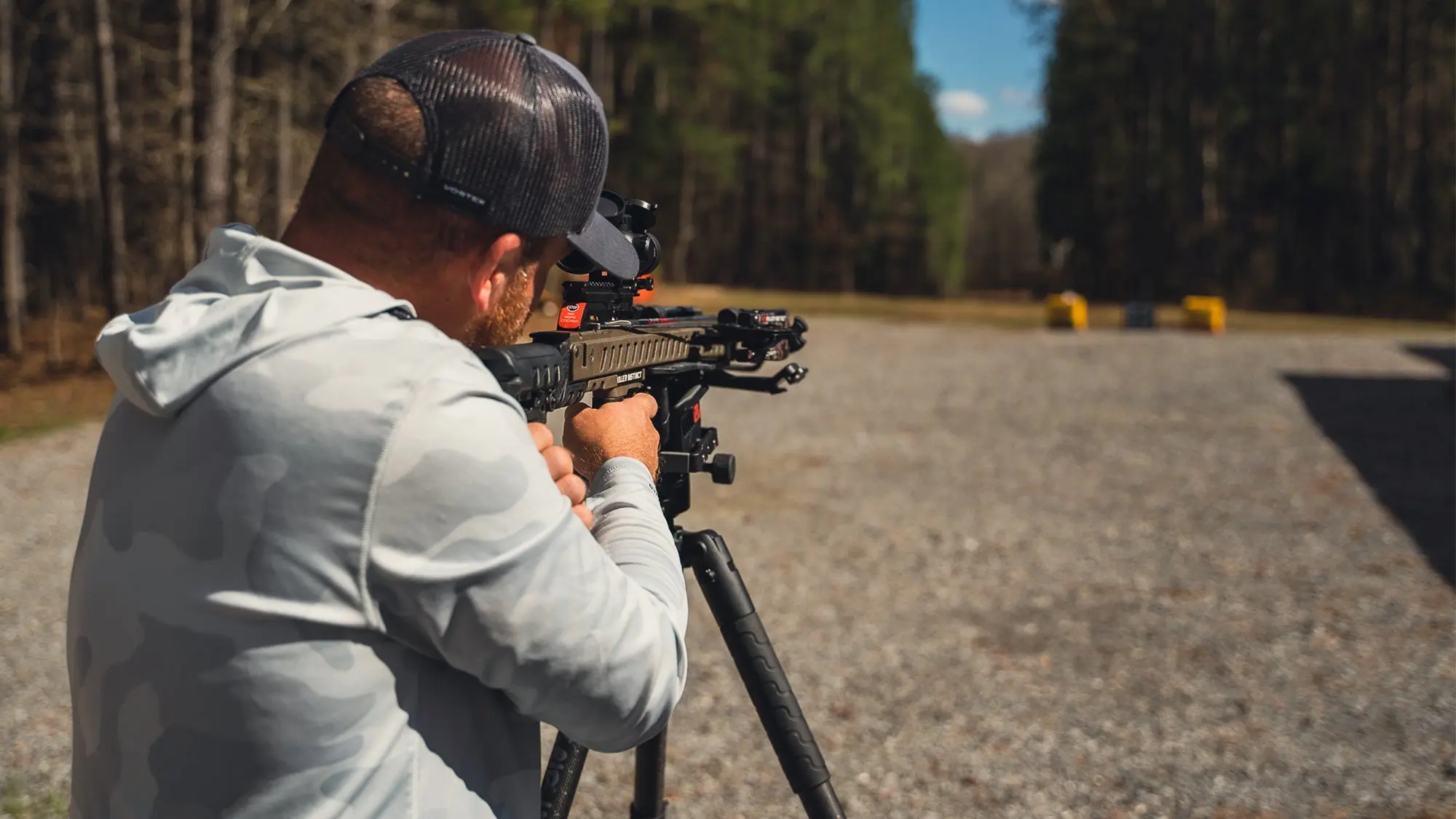
We measured group sizes with a digital caliper and then crunched the numbers to get an overall average group size for each crossbow. Along the way, we took subjective notes on things like cocking and de-cocking effort, handling, safety, and quality of accessories. This year’s test panel members included me, as well as Danny Hinton and Keith Meador, both of whom also helped me with the vertical bow test. Collectively, we have more than a century of bowhunting experience and have taken an estimated 400 big-game animals with archery equipment, crossbows included. Here’s what we found.
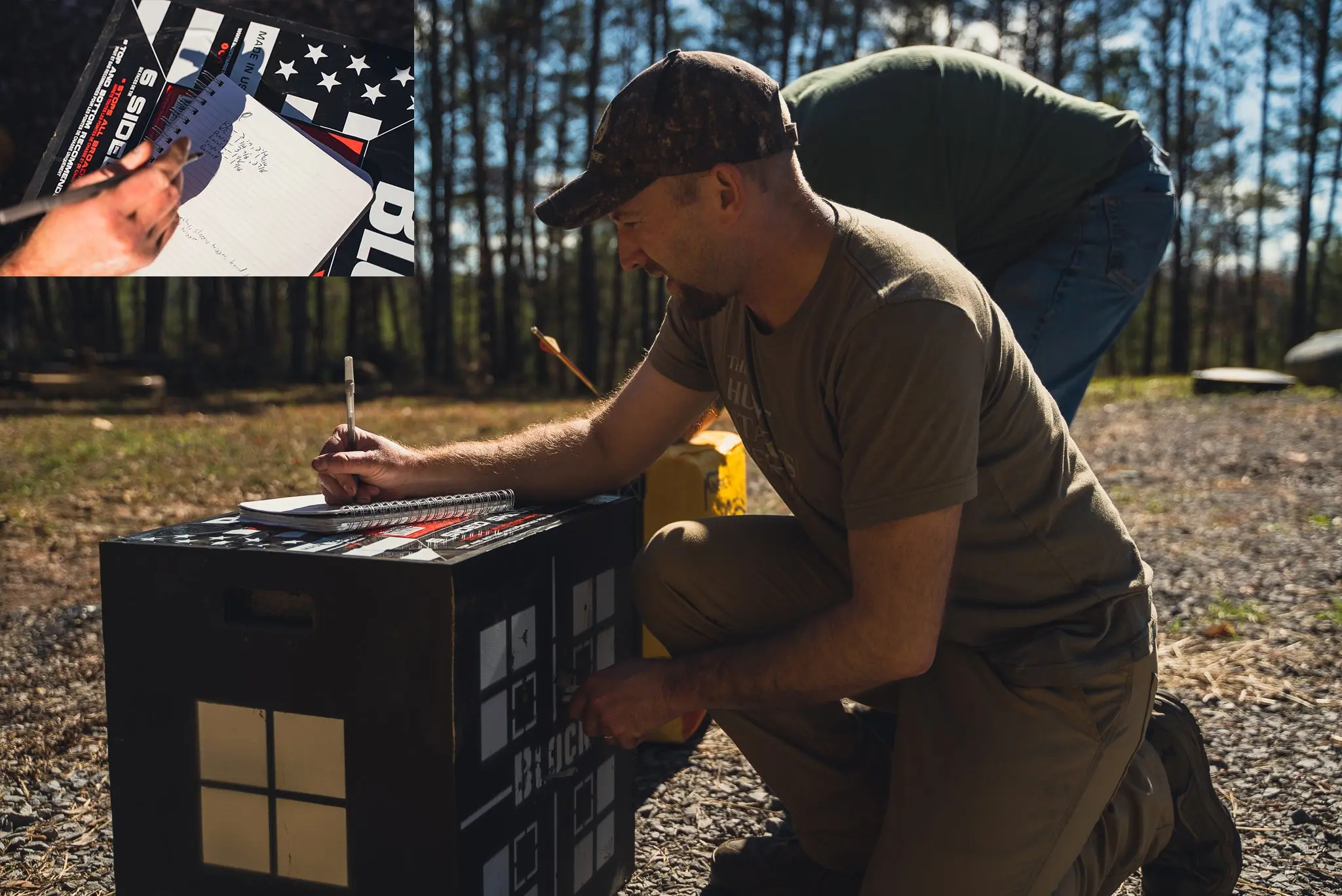
What To Look for in a Crossbow
Price
The best crossbow for the money is the one that best fits your desired parameters. These will vary from person to person, but the methodology used to assess each option remains the same. We can’t allow things like name brand, camo finish, or price-point dictate too much of the evaluation process. Sure, if you’re on the prowl for the best budget crossbow, price is a consideration. But often, the best bow for your budget isn’t the cheapest or the most expensive choice. The best bow is the one that fits into your budget and offers the most ideal combination of performance and features for you.
Recurve vs. Compound
If you’re new to crossbow hunting, your ideal bow could well be different from what a veteran crossbow hunter would desire. Similarly, if you’re only interested in compound crossbows then you certainly shouldn’t evaluate them against recurve crossbows. The experience between the two is very different and the comparison isn’t a logical one. The cams present in a compound crossbow let it generate more power in a compact package, as it doesn’t need the long limbs of the recurve to generate speed.
But recurve crossbows are easier to work on, saving you a trip to the pro shop every time you need an adjustment. You’ll need to decide if the small size of the compound is more desirable than the simplicity the recurve offers when making a choice. In the end, there is no singular “best” crossbow for everyone. There are, however, best crossbows for specific situations—including yours.
FAQs
Q: How long will a crossbow last?
Assuming you take care of it, there’s no reason you can’t expect a lifetime of use from your crossbow. Sure, you’ll need to replace cables and strings from time to time. But unless you’re shooting thousands and thousands of arrows each year, xbows are meant to take serious abuse and the limbs and other related stress-points have been tested to survive more shots than the average bowhunter will likely take.
Q: Can I kill a deer at 100 yards with the best crossbow?
Today’s crossbows are stupid accurate. It is possible to deliver an arrow with consistency on target at distances up to 100 yards, especially using the best crossbow scope. However, perhaps a better question is: Is it ethical to try and kill a deer at 100 yards with a crossbow? A lot of things can happen in the time it takes an arrow to travel 100 yards, even from a crossbow pushing 500 fps. There’s a reason you don’t see many videos of people attempting shots like that. If you can’t kill a deer with a xbow at lesser distances, you may need to re-evaluate your stand or blind setup to give you closer shots.
Q: Do I need to buy the most expensive option to get the best performance?
Not necessarily. While you often do get what you pay for, there are some great cheap crossbows out there that perform just as well (or almost as well) as their more expensive counterparts.
Final Thoughts
The TenPoint Flatline 460 was our clear winner. It put everything you want in a great crossbow—speed, power, balance, maneuverability, and accuracy—together is extremely well-built package with first-rate accessories. That said, if it’s raw accuracy and ruggedness you’re after, the Excalibur Assassin Extreme delivers.
Why Trust Us
For more than 125 years, Field & Stream has been providing readers with honest and authentic coverage of outdoor gear. Our writers and editors eat, sleep, and breathe the outdoors, and that passion comes through in our product reviews. You can count on F&S to keep you up to date on the best new gear. And when we write about a product—whether it’s a bass lure or a backpack—we cover the good and the bad, so you know exactly what to expect before you decide to make a purchase.


